BMW X1 vs Toyota Prius – Differences & prices compared
Compare performance, boot space, consumption and price in one view.
Find out now: which car is the better choice for you – BMW X1 or Toyota Prius?
The BMW X1 (SUV) comes with a Diesel MHEV, Petrol MHEV, Plugin Hybrid, Petrol or Diesel engine and Automatic transmission. In comparison, the Toyota Prius (Hatchback) features a Plugin Hybrid engine with Automatic transmission.
When it comes to boot capacity, the BMW X1 offers 540 L, while the Toyota Prius provides 284 L – depending on how much space you need. If you’re looking for more power, decide whether the 326 HP of the BMW X1 or the 223 HP of the Toyota Prius suits your needs better.
In terms of consumption, the values are 0.80 L per 100 km for the BMW X1, and 0.50 L for the Toyota Prius.
Price-wise, the BMW X1 starts at 38200 £, while the Toyota Prius is available from 39400 £. Compare all the details and find out which model fits your lifestyle best!
BMW X1
The new BMW X1 effortlessly blends sporty elegance with practical functionality, making it a standout choice in the compact SUV segment. Inside, the sophisticated cabin design is complemented by high-quality materials and cutting-edge technology, creating a welcoming and advanced driving environment. On the road, the vehicle's agile handling and responsive performance promise an engaging driving experience, whether navigating urban streets or embarking on longer journeys.
details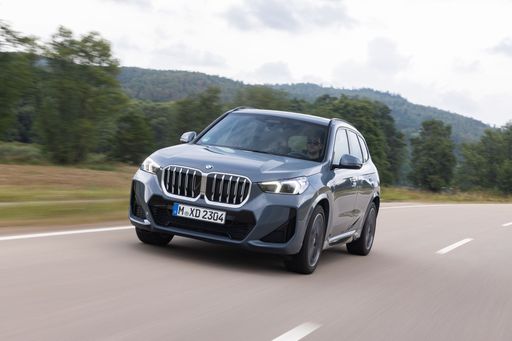 @ press.bmwgroup.com
@ press.bmwgroup.com
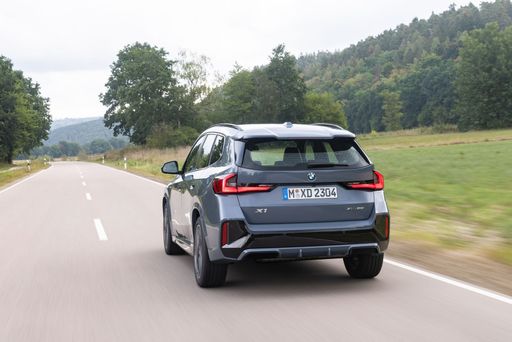 @ press.bmwgroup.com
@ press.bmwgroup.com
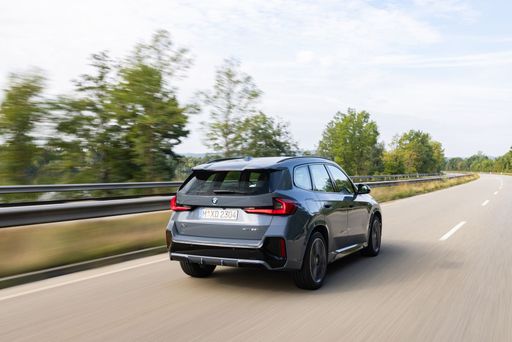 @ press.bmwgroup.com
@ press.bmwgroup.com
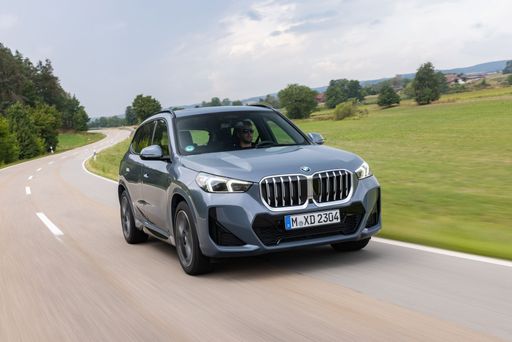 @ press.bmwgroup.com
@ press.bmwgroup.com
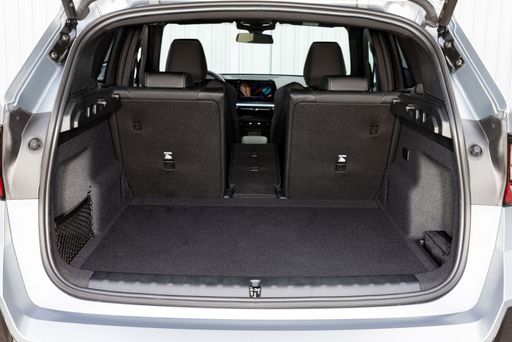 @ press.bmwgroup.com
@ press.bmwgroup.com
Toyota Prius
The Toyota Prius stands as a pioneer in the realm of hybrid vehicles, offering an eco-friendly driving alternative with its innovative technology. Its aerodynamic design and comfortable interior make it a practical choice for those looking to reduce their carbon footprint without sacrificing style. Additionally, the Prius boasts a reputation for reliability and efficiency, contributing to its lasting popularity among environmentally conscious drivers.
details @ Toyota
@ Toyota
 @ Toyota
@ Toyota
 @ Toyota
@ Toyota
 @ Toyota
@ Toyota

|

|
|
|
|
Costs and Consumption |
|
|---|---|
|
Price
38200 - 55500 £
|
Price
39400 - 45800 £
|
|
Consumption L/100km
0.8 - 7.7 L
|
Consumption L/100km
0.5 - 0.7 L
|
|
Consumption kWh/100km
-
|
Consumption kWh/100km
-
|
|
Electric Range
81 km
|
Electric Range
72 - 86 km
|
|
Battery Capacity
14.20 kWh
|
Battery Capacity
-
|
|
co2
18 - 175 g/km
|
co2
12 - 17 g/km
|
|
Fuel tank capacity
47 - 54 L
|
Fuel tank capacity
40 L
|
Dimensions and Body |
|
|---|---|
|
Body Type
SUV
|
Body Type
Hatchback
|
|
Seats
5
|
Seats
5
|
|
Doors
5
|
Doors
5
|
|
Curb weight
1575 - 1935 kg
|
Curb weight
1620 - 1630 kg
|
|
Trunk capacity
490 - 540 L
|
Trunk capacity
284 L
|
|
Length
4500 - 4505 mm
|
Length
4599 mm
|
|
Width
1845 mm
|
Width
1782 mm
|
|
Height
1622 - 1642 mm
|
Height
1470 mm
|
|
Payload
490 - 500 kg
|
Payload
365 - 375 kg
|
Engine and Performance |
|
|---|---|
|
Engine Type
Diesel MHEV, Petrol MHEV, Plugin Hybrid, Petrol, Diesel
|
Engine Type
Plugin Hybrid
|
|
Transmission
Automatic
|
Transmission
Automatic
|
|
Transmission Detail
Dual-Clutch Automatic
|
Transmission Detail
-
|
|
Drive Type
Front-Wheel Drive, All-Wheel Drive
|
Drive Type
Front-Wheel Drive
|
|
Power HP
136 - 326 HP
|
Power HP
223 HP
|
|
Acceleration 0-100km/h
5.4 - 9.2 s
|
Acceleration 0-100km/h
6.80 s
|
|
Max Speed
190 - 250 km/h
|
Max Speed
177 km/h
|
|
Torque
230 - 477 Nm
|
Torque
-
|
|
Number of Cylinders
3 - 4
|
Number of Cylinders
4
|
|
Power kW
100 - 240 kW
|
Power kW
164 kW
|
|
Engine capacity
1499 - 1998 cm3
|
Engine capacity
1998 cm3
|
General |
|
|---|---|
|
Model Year
2023 - 2025
|
Model Year
2023
|
|
CO2 Efficiency Class
D, E, B, F
|
CO2 Efficiency Class
B
|
|
Brand
BMW
|
Brand
Toyota
|
BMW X1
The New BMW X1: A Fusion of Innovation and Performance
For those in search of a luxury SUV that masterfully combines technical innovation with driving pleasure, the BMW X1 stands as a paragon of design and engineering excellence. As part of the competitive compact SUV segment, the BMW X1 offers a robust array of features targeted towards both the tech-savvy and the driving enthusiast.
Advanced Engine Options
The BMW X1 delivers a versatile range of powertrains to suit the specific needs of different drivers. From the efficient diesel engines to cutting-edge plug-in hybrid variants, there’s a model for every preference. The diesel variants, including mild-hybrids, provide a balance between fuel efficiency and power delivery. Petrol engines, on the other hand, offer spirited performance with a more traditional feel.
Efficiency Meets Performance
The BMW X1's remarkable range of power, from 136 PS to an impressive 326 PS, caters to diverse driving needs. Models fitted with mild-hybrid technology afford drivers reduced fuel consumption and emissions, with the plug-in hybrid leading the field in eco-efficiency with consumption figures as low as 0.8 L/100km and an electric range of up to 83 km.
Technological Innovation
Stepping inside the BMW X1, drivers are greeted with an intuitive cockpit, seamlessly integrating the latest BMW technology. An advanced infotainment system offers connectivity at the touch of a button, while an array of driver assistance systems ensure that safety and convenience are at the forefront.
Design and Comfort
The BMW X1 exudes a powerful presence on the road with its refined SUV aesthetics. Offering substantial interior space, it comfortably accommodates up to five passengers with ample boot capacity ranging from 490 to 540 litres. BMW also offers various trim levels, including the luxurious M Sport package, that enhance both the aesthetic and dynamic appeal.
Dynamic Driving Experience
BMW enthusiasts will appreciate the dynamic handling characteristics synonymous with the brand. Whether it's the front-wheel drive or the xDrive all-wheel system, the BMW X1 delivers responsive handling and a smooth driving experience, making it ideal for both urban and motorway driving scenarios.
Conclusion
The BMW X1 raises the bar for compact SUVs, offering a harmonious blend of innovation, efficiency, and driving pleasure. For those seeking a vehicle that stands out both in terms of aesthetics and technology, the X1 is undoubtedly a worthy contender.
Toyota Prius
The All-New Toyota Prius: Revolutionising Efficiency and Performance
The Toyota Prius, a name synonymous with hybrid innovation, has once again shown why it remains at the forefront of eco-friendly automotive technology. The latest models have enhanced technical features and innovations, setting new standards for efficiency and driving experience.
Hybrid Performance: A Leap Forward
The latest Prius models employ a sophisticated 2.0 litre Plug-in Hybrid system that flawlessly melds petrol and electric power. With a power output of 223 PS, it propels the Prius with impressive dynamism, reaching 0-100 km/h in just 6.8 seconds. This performance-oriented aspect of the Prius does not compromise on efficiency, with an astonishing fuel consumption ranging from 0.5 to 0.7 L/100km.
Electric Range and Efficiency
One of the key highlights of the new Prius is its substantial electric-only range. Depending on the variant, it can travel between 72 to 86 km on electric power alone, making it an ideal choice for urban commutes where zero emissions are preferred. The hybrid system's CO2 emissions are remarkably low, between 12 and 17 g/km, contributing to its CO2 Efficiency Class B rating.
Engineering Excellence with CVT
The Prius is equipped with a state-of-the-art Continuously Variable Transmission (CVT), ensuring a smooth and efficient drive. This advanced transmission supports the front-wheel-drive layout, delivering power seamlessly and enhancing driving pleasure without sacrificing fuel economy.
Stylish Design and Comfort
Designed as a sleek five-door hatchback, the Prius offers a comfortable and spacious interior with seating for five passengers. It measures 4599 mm in length, 1782 mm in width, and 1470 mm in height, offering a practical balance of size and comfort. The boot space, while tailored for the hybrid battery, still provides a decent 284 litres of storage.
Cost Efficiency
The running costs of the Prius are competitive, with monthly expenses estimated between €1064 and €1188, and cost per kilometre ranging from 42.6 to 47.5 cents. Its efficient design results in a maximum speed of 177 km/h and a practical fuel tank size of 40 litres, ensuring less frequent stops on longer journeys.
Conclusion: The Prius Legacy Continues
The Toyota Prius continues to lead by example in the realm of hybrid technology. Combining impressive power with unmatched efficiency and a sophisticated driving experience, it is clear that the Prius remains a compelling choice for the environmentally conscious driver. Its innovative features and favourable cost metrics only bolster its appeal in the modern automotive landscape.
What drivetrain options does the BMW X1 have?
The BMW X1 is offered with Front-Wheel Drive or All-Wheel Drive.
The prices and data displayed are estimates based on German list prices and may vary by country. This information is not legally binding.
